England’s leg of the inquiry was full of character assassinations, effing and jeffing and flip-flops. Anything of note was lost when the PM’s phone was mysteriously wiped. If it hadn’t been for the Lockdown Files, we probably would have never learned that masks in schools were introduced to avoid an argument with Nicola.
But in Scotland, some of the decision-makers began to loosen their tongues: officials “froze” in the face of the evidence about the virus; Sturgeon let it be known that in wanting to be the person who drove Covid out of Scotland, she entered into direct Twitter messaging with Professor Sridhar. We also learnt that Sir Gregor Smith, Scotland’s CMO, deleted his WhatsApp messages “at the end of every day” and encouraged his colleagues to do so too.
We have already written that the Welsh First Minister considered lockdowns a failed experiment and that Welsh Government ministers were using disappearing messages. But all this pales into insignificance with the latest testimonies in Wales.
In testimony, Simon Hart, the Secretary of State for Wales during the pandemic, said the different rules were brought in for the “sake of it”.
Tom Poole, the KC to the Welsh Inquiry, asked:
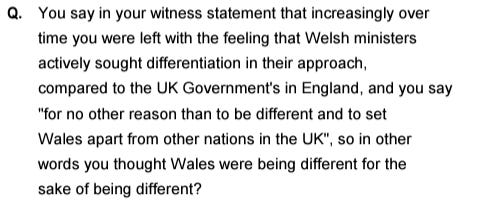
Mr. Hart’s response is somewhat astonishing.

Tom Poole pushed the point further by asking:

Also on the stand was the most senior special adviser to the Welsh Government, Jane Runeckles. Runeckles was a member of three WhatsApp groups: ‘Drake Spads’, ‘coronavirus legal hotline’ and a group involving Welsh Government ministers.
As a special adviser, she was responsible for 14 other special advisers who supported the First Minister and individual Welsh ministers.
From January 1st 2020 to 31 May 2022, Runeckles used her personal mobile phone to send WhatsApp messages. The KC put it to her that she was prohibited from doing so:
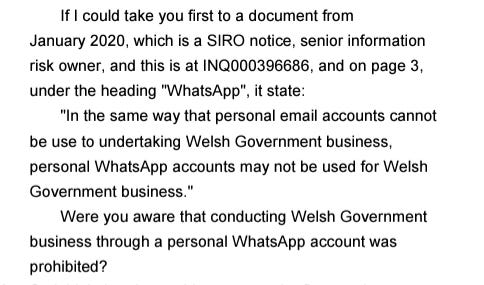
Hallett intervened when Runeckles tried to obfuscate:

The Welsh Government Information Management and Governance Policy states: “Staff should be aware that when using their [Welsh Government] phones in this way they are in fact creating ‘public records’. Staff using private phones for [Welsh Government] business may also be creating public records.”
Runeckles was in a bind. She said she was aware of the policy but was then asked why she turned on disappearing messages.
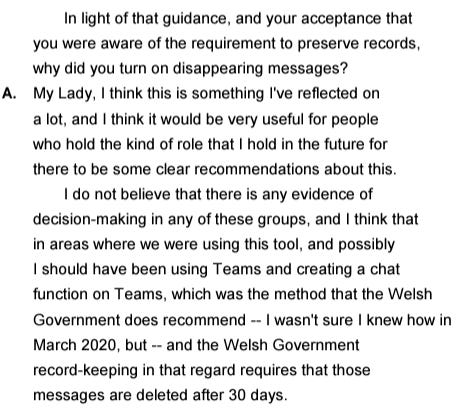
Hallett waded in, as she was having none of it:
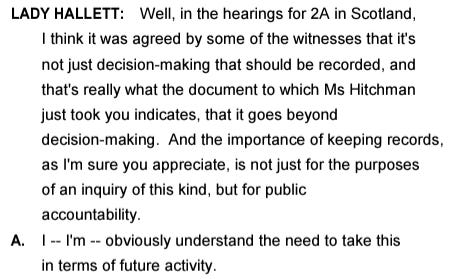
Runeckles was further on the hook when some retrieved messages revealed direct lockdown business was happening on WhatsApp.
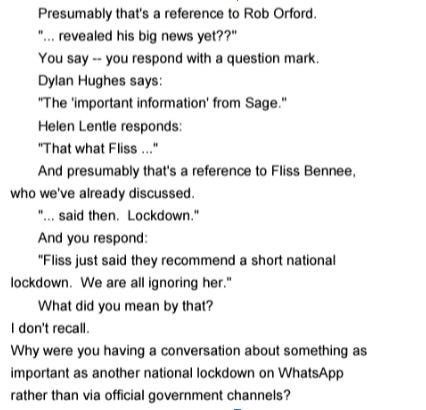
The Welsh leg of the inquiry tells us pandemic business was taking place on WhatsApp; chat was how lockdown discussions were done and then deleted.
We have gleaned that lockdowns in Wales were implemented as an experiment and for the sake of it. However, over the three legs of the inquiry there has been no indication that any decision was based on evidence.
In the pandemic politics replaced public health: we wonder if the WhatsApp messages had been disclosed in full, whether they would have revealed the logic behind the decision-making was far worse or absent altogether.
This post will not self-destruct or self-delete; it isn’t an experiment, won’t flip-flop, and isn’t commercially sensitive. You will not incur a fixed penalty notice if you choose not to read it, and it isn’t written just for the sake of it.
Prof. Carl Heneghan is the Oxford Professor of Evidence Based Medicine and Dr. Tom Jefferson is an epidemiologist based in Rome who works with Professor Heneghan on the Cochrane Collaboration. This article was first published on their Substack, Trust The Evidence, which you can subscribe to here.
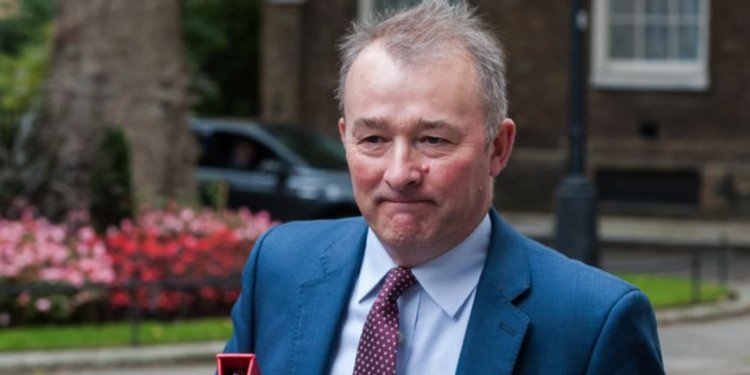











To join in with the discussion please make a donation to The Daily Sceptic.
Profanity and abuse will be removed and may lead to a permanent ban.
No one seriously believes that Truss was removed by the pooliticalclass on account of then first budget her Chancellor presented. Shewas toast as soon as she b eat Sunak, who was the favoured winner by them including the Speccie and DT.
Led by the completely independent Bank of England, one should note.
With plenty of help from the BoE’s chums on the Treasury Committee, whose then Chair happened to have been Sunak’s failed campaign manager, and who was subsequently rewarded with a govt dept (DWP).
Suggestion – put a ‘(P)’ after links to paywall articles?
That’s a good suggestion.
A way round paywalls was shared – and gratefully received by me – by someone on here a few months ago. Apologies to whoever it was, my old memory box can’t recall the name.
Copy / paste the link to:
http://archive.today/
and I’ve found that helps in most cases.
Previously, I found that the advice to press ESC as the page loads to defeat the paywall, or the X button in your mobile browser address box, never worked for me. Probably fingers not nimble enough.
If you hold a local authority library card you can access just about every publication.
Download an app called Press Reader, sign in with your library card & off you go.
On the topic of migrants in Italy, the tiny island of Lampedusa could actually be anywhere in Africa if you look at this footage. I honestly don’t know what the plan is for all of these migrants that are saturating the place. It looks like chaos. 6000-8000 arrivals ( the numbers vary depending on which source you read ) on Tuesday alone.
”The situation on the Italian island of Lampedusa is coming to a head, with the local government declaring a state of emergency after more than 6,000 illegal migrants were registered on the small Italian Mediterranean island on Tuesday.
Besides an influx of hundreds of boats sailing toward Italy’s harbors, scenes of violence were recorded, with migrants trying to break through police lines.
“Apocalypse on Lampedusa. Italian police are trying to keep illegal African migrants in check. Meanwhile, 160 boats have arrived with 8,000 illegals: just young, strong men who are migrating into our social systems,” wrote former Alternative for Germany (AfD) politician Georg Pazderski on X.
Mayor Filippo Mannino has responded by declaring a state of emergency on Wednesday evening, as reported by the Ansa news agency. He demanded more support for the small island, which he said is under “great stress.” Officially, the number of migrants on the island now outnumbers the actual residents.
“Everyone has helped in some way the migrants who needed help. But now it’s really time to look for a structural solution,” Mannino said. However, it is unclear what the state of emergency will actually achieve without concrete support from the ruling conservatives in Italy, who already declared a nationwide emergency in April as migration numbers soared via the Mediterranean route.”
https://rmx.news/italy/apocalypse-italys-lampedusa-hit-with-6000-migrants-in-24-hours-as-state-of-emergency-declared/
‘…Officially, the number of migrants on the island now outnumbers the actual residents.’
Shocking and frightening, actual and rightful residents being usurped by the migrants.
Who is going to pay to house, feed and clothe the migrants? Not the government but the people – the actual residents – via their never ending taxes. Frightening, very frightening.
The alleged ‘pm in waiting’ Starmer throwing open the door for Britain to be swamped by migrants – at the long suffering taxpayers expense.
https://www.dailymail.co.uk/news/article-12517147/Keirs-PM-waiting-tour-Europe-Starmer-cosies-EU-unveiling-open-door-plan-migrants-Greece-Italy-visit-Hague-ahead-meeting-Macron-Paris-King.html
Another 1000 today..if you can bear to watch…
I don’t see how this isn’t an invasion..it’s people from another country illegally overwhelming another ….and if you look at the crime figures..they don’t come in peace…
https://twitter.com/RadioGenova
Meloni has shafted her fellow Italians good and proper hasn’t she? Of course they will be travelling all around mainland Europe too. What an absolute disgrace. Do they just think the problem will go away on its own ffs?? This isn’t an issue easily resolved, well, not unless you can send them all back, which is never going to happen, and has huge knock-on effects for Europeans generally. Crazy.
‘Population replacement’ in action, nothing to see here, move along…
There’s no context and I don’t know which country this is but OMFG!!!!
https://twitter.com/RadioGenoa/status/1702614144803909918
I do completely agree with Richard Dawkins here. I’ve never understood why ”phobia” is put on the end of a word, such as ”Islamophobia” or ”transphobia” when a phobia is a fear of something, therefore it’s not even factually or grammatically correct. It’s just another slur ( like ”anti-vaxxer” etc ) to label people who raise valid concerns over what’s happening in our world today.
“Islamophobia is a deeply silly and pernicious abuse of language, and is not the only fashionable word ending in -phobia that condemns itself as a last-resort substitute for rational discussion,” Dawkins posted on Twitter late Tuesday, in reference to “homophobia,” “transphobia,” and other phobias du jour.
“If your belief is indefensible, your ignominious last resort is to accuse your critics of ‘phobia,’” Dawkins says in a YouTube video posted earlier this week.
And yet, phobia “is defined as irrational fear, as in arachnophobia, agoraphobia etc.,” he states.
Dawkins notes that curiously, while most of his attacks on religion have been against Christianity, he has never been accused of “Christophobia,” and yet he is “regularly berated for Islamophobia.”
https://www.breitbart.com/faith/2023/09/13/richard-dawkins-islamophobia-a-deeply-silly-and-pernicious-abuse-of-language/
‘Phobia “is defined as irrational fear”’. Whereas a fear of Islam is completely rational, as we see our culture, values and legal system taking a knee in submission to that ideology. Because racism.
The Russian invasion was a rational act
‘It is widely believed in the West that Russian president Vladimir Putin’s decision to invade Ukraine was not a rational act.’
A classic Aunt Sally!
In fact it is widely recognised by all who care to take an interest that Putin’s invasion of Ukraine was not only a rational act but part of a wider plan to regain the previously Soviet sphere of influence for the Russian federation.
‘While the 9th Directorate of the FSB’s Fifth Service Department for Operational Information prepared for the occupation of Ukraine from July 2021, the 11th Unit of the Department for Operational Information, responsible for Moldova, was assessing plans for the next round of operations under the direction of Major General Dmitry Milyutin. In November 2020, the FSB’s strategic objective in Moldova was to bring about ‘The full restoration of the strategic partnership between Moldova and the Russian Federation’.
FSB Outline of Operational Aims and Means, 21 November 2021.
‘The Moldova plan, again in parallel with the one for Belarus, is broken up into three different chapter headings: the political, military and defense sectors; the humanitarian sector; and trade and economy sectors. These headings stipulate specific milestones the authors would like to achieve in the short term (by 2022), medium term (by 2025) and long term (by 2030). That final target year, the document says, should see the “creation of stable pro-Russian groups of influence in the Moldovan political and economic elites.”
(Russian) Presidential Directorate for Cross-Border Cooperation, 2021
Supporters of Putin can now see his true colours (as if they couldn’t before) in his embarrassingly obsequious alliance with the barbaric and inhuman dictator of North Korea….edifying……not at all; weak.
”Supporters of Putin ”
I neither support or oppose Putin and feel that somehow the Western World has artificially created the Russian bogeyman idea;
”I’ve learned to hate the Russians
All through my whole life
If another war comes
It’s them we must fight
To hate them and fear them
To run and to hide
And accept it all bravely
With God on my side”
When the old Soviet Russia collapsed the rest of the World had every opportunity to help Russia to become a productive and welcome partner in the modern world. Instead I feel the West had a great part to play in pushing Russia into the position where it felt it had no choice but to act like it is currently doing.
It seems to me that Putin is a very old fashioned style true Russian, when he deals with North Korea his only thought is whether by doing this he can gain some benefit for Russia, it is the same when he deals with China, his only concern and interest is; does it benefit Russia?
The irony is that the Western World’s response to the Ukraine war and all the sanctions seem to have only served to strengthened Russia’s self reliance and independence and to have pushed the establishment of new alliances such as the strengthening military alliance with China.
..Of course it’s typical of people to try to accuse Putin of things which are pretty ludicrous, and NEVER going to happen, while with complete hypocrisy, ignoring the crimes of the most Imperialistic country in the world…America….
It’s the same American playbook time and again…build up the ‘evil’ ruler…Saddam, Assad, Gaddafi, Putin, XI….whoever…they’re mad, bad, evil, un-democratic…..
Well the vast majority of the world, and a great many Westerners see it exactly for what it is….America and her NATO vassals poking and prodding another country’s Government with shameless provocations….and they are absolutely saying it all the time..it’s a plan to weaken Russia..not some high-minded thing….and in this instance using the poor Ukrainians for the project….
Claire Daly the MEP, claimed in the European Parliament earlier this month that at least 500.000 Ukrainians had been killed and injured In this conflict, she wasn’t corrected by anyone…
Ukraine will be a rump state, reliant on others for years to come..the millions who have left are highly unlikely to return…
We’ve seen it before..American projects rarely have a happy ending for the poor proxy’s…and of course they know he truth of it..they just wont admit to the horror they’ve unleashed……To The Last Ukrainian…
Yes, entirely rational, as is his aspiration to regain large parts of the USSR sphere of influence as a buffer between Russia and prosperous democracy.
Crystal clear that, ultimately, the Baltic States, and so NATO, will have a day of reckoning if Putin’s entirely rational expansionism is not stopped.
So, war for this country down the road or support for Ukraine today.
That is our entirely rational choice.
Didn’t Churchill meet the barbaric and inhuman Stalin several times?
Yes, and for the same reason: weakness.
‘Bernard Looney’s card was marked….’
It certainly was, according to his ex-wife:
‘God’s plan is always worth the wait’
Why are these BP johnnies so weird or is it just deja vu all over again regarding CEOs (and senior officers) of major organisations in the public/para-statal sector?
Something to do with (absolute) power?
“Extolling the benefits of population decline is straight out of the anti-growth coalition playbook”
Maybe. Also the “population decline” seems to affect White Europeans a lot more…
This is very dangerous. Essentially being locking up the healthy for not complying with a medical intervention.
The public health tyrants really want this to stick and are going to try it as often as they can until it becomes accepted in society.
“Unvaccinated pupils face 21-day isolation as measles cases rise”
WTAF? In an ongoing situation this means unjabbed kids could be off for months whenever another case appears – never mind the significant benefits of being exposed and developing natural immunity. Is this an underhanded way of banning unjabbed kids from permanently attending school and thus forcing jabbination? They also seem blithely unaware that jabbed kids can a) get measles anyway and b) can be vectors of spread. Notice there’s no advice on boosting children’s immune systems either. Quelle surprise.
https://anthraxvaccine.blogspot.com/2023/05/measles-rears-its-ugly-head-again-here.html
Makes home education even more important to escape the mendacious tentacles of state over reach.
This is the deleterious consequence of allowing “Public Health” a say in individual cases.
Public Health isn´t medicine.
It should be transferred to sociology or politics – and its funding drastically cut.
Has Theresa Tam – or any other doctor in Canada – never heard of Cochrane reviews?
In particular, the one on masks by the professor of empirical medicine at Oxford, Carl Heneghan?
From:
https://www.bbc.co.uk/news/live/world-africa-66815068
Where’s BBC Verify when you want it? Martin Griffiths is a lying bastard.
Libya built two dams in the valleys above Derna, one upstream from the other. They would not have built them if they did not expect to fill both reservoirs behind them with water. They expected water to accumulate – in other words rain is not unusual even in Libya. Why the dam furthest upstream failed will be subject to engineering review; my first guess is uncontrolled spillover eroding the structural integrity of the dam. The first dam failing sent an unmanageble quantity of water downstream and overwhelmed the second dam and released its stored water as well. With the stored water of two whole reservoirs coursing down the valey the city did not stand much chance, though warnings that the dam was failing might have helped.
The UK has had near misses but on a much smaller scale: There was a mad scramble to manage the spillover at the Whaley Bridge reservoir when the dam began to fail. People were evacuated from their homes. That failure was eventually put down to ‘poor design and a lack of maintenance‘ according to an official report.
The collapse of the dams above Derna is nothing to do with climate and everything to do with shonky engineering. The flooding is not weather related, it’s an engineering disaster.
Marty Makary MD, MPH
@MartyMakary
What if I told you 1 in 50 people who took a new medication had a “medically-attended adverse event” and the manufacturer refused to disclose what the complication was, would you take it? And what if the theoretical benefit only lasted for a 3-mo window after which time the benefit is gone? and that the FDA cleared it without any human outcomes data, would you take it? and that European regulators are not universally recommending the same medication for everyone as the CDC is? and that Drs. Ashish Jha and Mandy Cohen are making unsupported claims that it reduces hospitalizations, long-Covid, and makes you less likely to spead Covid (if the manufacturers made those same claims they could be fined by the FDA for making false marketing claims beyond it’s approved indication)
That’s the new Moderna Covid vaccine. FDA or Moderna (I can’t tell the difference sometimes) should disclose the details of the clinical trial complication rather than keeping it secret.
Well it’s a no from me…!!